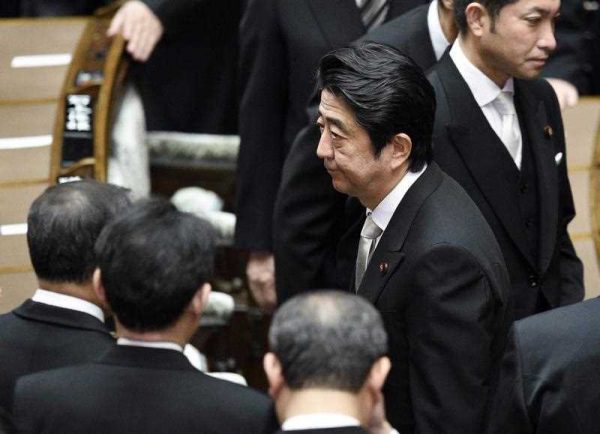On 17 January Japanese Prime Minister Shinzo Abe pledged US$200 million in non-military aid for countries fighting ISIS.
It appears that the Japanese hostages have since been killed. But the Japanese government has maintained their position: while protecting hostages’ lives is a priority, the government will not yield to terrorism and will continue to provide non-military assistance to the Middle East. ‘Peace and stability in the Middle East is extremely important for Japan from the standpoint of energy security and contribution to international issues’, Abe declared on 26 January.
But, despite the government’s unwavering determination to continue its engagement in the Middle East, the Japanese public seems hesitant. So, will the hostage crisis pose a challenge to Japan’s diplomatic efforts in the Middle East?
The brutality shown by ISIS in decapitating innocent Japanese hostages could generate three possible responses from the Japanese public.
First, the Japanese public may be impelled to oppose involvement in international conflicts, strengthening the country’s longstanding commitment to pacifism. It is reasonable to believe that Abe’s policy of ‘Proactive Contribution to Peace’ could put Japanese lives at risk from terrorist threats. ISIS demanded the Japanese people ‘pressure the government in making a wise decision to save the lives of your citizens’.
Second, at the other end of the spectrum, the hostage crisis could strengthen the Japanese government’s resolve to boost Japan’s role in and commitment to the US-led global ‘war on terror’ to effectively safeguard national security. The public could rally behind Abe’s ‘Proactive Contribution to Peace’ policy and his attempt to remove constitutional constraints on the Japan Self-Defense Forces (SDF). As Abe’s pledge to offer only ‘non-military assistance’ has not made Japan less of a target, expanding the scope of Japan’s military overseas could better protect Japanese citizens.
The split in Japanese society over the hostage crisis is based on already polarised opinions regarding Abe’s defence and security policy. Abe supports allowing Japan to exercise the right to collective self-defence. In July 2014 his administration issued a cabinet decision to reinterpret the Article 9 ‘peace clause’ of the Constitution, which is aimed at allowing the SDF to exercise limited forms of collective self-defence.
According to an opinion poll by Kyodo News, the sharp divide in public opinion on constitutional reform was evident only two days after the Lower House election in December 2014. Even though Abe won a landslide victory in the election, 55.1 per cent of the respondents did not support Abe’s defence and security policies, compared to 33.6 per cent who did.
But the hostage crisis will not necessarily further polarise Japanese opinion on Abe’s security policy. There is a third opinion of the crisis that delinks the hostage incident from Japan’s Middle East policy.
Japanese citizens have criticised the two Japanese hostages for being ‘reckless’ and ‘irresponsible’ in travelling to Syria. The Japanese government had advised Japanese nationals to leave Syria in April 2011 and therefore some assert that the pair ‘had brought the situation upon themselves’. Some even declared that no taxpayer money should be used as ransom to secure the hostages’ lives.
There is a precedent in Japan for blaming hostage incidents on the recklessness of the victims. In 2004, a group of Japanese people were taken hostage in Iraq. While the Japanese hostages returned home unharmed, they were severely criticised for being carelessness in travelling to a hazardous place and put themselves at risk.
The public debate over the hostage crisis will continue in the short term. But the split in public opinions will not necessarily pose a challenge Japan’s Middle East policy.
According to a Kyodo News poll, released on 7 February, more than half of the Japanese public supports Japan’s continuing engagement in the Middle East, if it is limited to non-military aid. In the case of the US$200 million in humanitarian aid for countries fighting ISIS, 53.8 per cent said the aid should be provided as announced, while 18 per cent said the amount should be reduced and 14.6 per cent asked the aid to be cancelled.
Even the major opposition party, the Democratic Party of Japan (DPJ), has not opposed Abe’s overall engagement policy in the Middle East. Instead the DPJ has focused on questioning the ‘timing’ of the announcement. The DPJ questioned whether the Abe government had fully considered the consequences of announcing non-military assistance in the region when ISIS was known to be holding Japanese citizens captive.
This is not to say that Japan’s approach to engaging in the Middle East — where Japan offers overseas development assistance in exchange for oil and gas imports — will remain unchanged. With the dropping oil price and potential for new suppliers due to the shale gas revolution in the US, Japan may be less reliant on the Middle East for it energy security in the future. At the same time, the relaxation of old prohibitions on arms exports, as part of Abe’s ‘Proactive Contribution to Peace’ policy, might open up a new way to engage in the region.
Emily S. Chen is a graduate student at the Center for East Asian Studies, Stanford University.


The full horror of these murders, and of the more recent slaughter of Egyptian Copts in Libya, is unfortunately not captured by the standard English words of ‘beheading’ or ‘decapitation’. Cutting off the head of a victim with a knife or cleaver is not what those two terms imply.